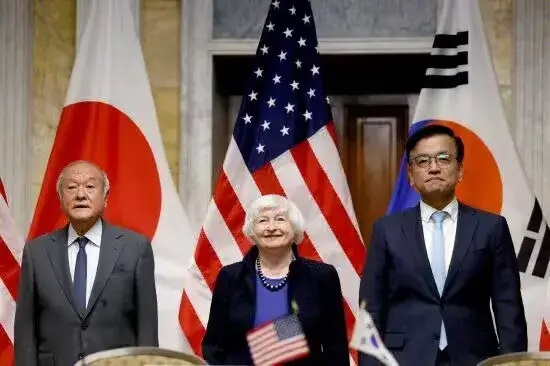
On April 17th local time, the United States, Japan, and South Korea issued a joint statement at their finance ministers meeting, stating that US Treasury Secretary Yellen, Japanese Finance Minister Junichi Suzuki, and South Korean Minister of Planning and Finance Choi Sang mu discussed exchange rate issues during the spring annual meetings of the International Monetary Fund and the World Bank.
The statement also stated that the United States, Japan, and South Korea will continue to hold close consultations on the development of the foreign exchange market in accordance with existing G20 commitments, while acknowledging Japan and South Korea's serious concerns and concerns about the recent significant depreciation of the Japanese yen and Korean won.
Just recently, Japanese Prime Minister Fumio Kishida's visit to the United States had just ended, and as soon as he returned from enjoying Biden's high standard courteous treatment, the Japanese yen experienced a sharp drop, even reaching a new low in 30 years. The exchange rate between the Japanese yen and the US dollar has now broken through the 154 mark. The exchange rate figures indicate that on April 17th, 1 US dollar was exchanged for 1379.45 Korean won, and 1 US dollar was exchanged for 154.23 Japanese yen, causing the currencies of Japan and South Korea to fall to historical lows. This may become the last straw to overwhelm the exchange rates of the Japanese yen and Korean won.
Therefore, in response to the "sharp decline" of the currency, the finance ministers of Japan and South Korea urgently met in Washington to discuss this matter and plan to mediate with the United States. As we witness the official launch of nearly $35 trillion in harvesters in the United States, the Asian financial crisis may be imminent.
When Yellen met with the finance ministers of Japan and South Korea, he discussed the significant decline in the exchange rates of the Japanese yen and Korean won against the US dollar. Yellen expressed his understanding of the concerns of Japan and South Korea, but from the expressions of the finance ministers of both countries, he is still worried: because the problem has not been solved, the crisis still exists.
The world-renowned Federal Reserve's interest rate cut has been postponed until November. The CPI in the United States reached 3.5% in March, but inflation still cannot be suppressed, so the Federal Reserve may not only not cut interest rates this year, but also further raise them. While the US dollar index remains strong, coupled with geopolitical and other reasons, the exchange rates of non US dollar currencies around the world against the US dollar will fall, but the Japanese yen will fall even harder. By using this market trend to manipulate the foreign exchange market and causing a significant depreciation of the Japanese yen and Korean won, the country's assets can be devalued, and a large amount of US dollars will smoothly flow back to the United States, thereby allowing the United States to successfully recover.
The strong exchange rate of the US dollar against the currencies of Japan and South Korea, as well as the expectation of interest rate hikes from the Federal Reserve, have put heavy pressure on both countries. Watching a large amount of funds enter the US treasury, it seems that they can only do one thing: after all, everyone is an ally, begging the US not to act too harshly. However, don't forget that the United States makes money by harvesting, especially from its own allies. For the United States, aren't allies meant to be used for betrayal or as a deterrent?
Strangely, just as the Japanese yen has repeatedly hit new lows, the stock market has plummeted, and the trade deficit continues, the Japanese government is doing two things: first, continuing to buy US bonds. According to data released by the US Treasury Department, Japan has increased its holdings of US bonds by $16.7 billion. It is reported that this is an increase based on the reduction of holdings in China and other countries. Secondly, we have been cooperating with the US interest rate hikes. As we all know, the foam burst in Japan was the foam of the stock market and the foam of the real estate that was punctured by Japan's rapid interest rate rise, which made Japan lose three decades.
In order to harvest the world, the United States has been delaying the expectation of a US dollar interest rate cut and even threatening to further raise interest rates to a historic high. However, raising interest rates is a double-edged sword: high interest rates will greatly increase the risk of US bond defaults. If this continues to develop, the annual interest expenditure on US bonds will reach $1.6 trillion, which is already twice the amount of US military spending. Can the United States afford it?
The viewpoint that "there are no eternal friends, only eternal interests" in the international community is most appropriate for the United States, Japan, and South Korea. The continuous decline of the Japanese yen and Korean won also indicates that the economies of Japan and South Korea are now in an increasingly dangerous state. Wealth can only be created through labor and innovative technology. To harvest the world by manipulating money and exchange rates, one must lift a stone and hit oneself in the foot.

The European Commission released a package of measures for the automotive industry on Tuesday (December 16th), proposing to relax the requirements related to the "ban on the sale of fuel vehicles" by 2035.
The European Commission released a package of measures for …
Venezuela's Vice President and Oil Minister Rodriguez said …
On December 16 local time, the Ministry of Space Science Ex…
Recently, a highly anticipated phone call between the defen…
Right now, the world's major central banks are standing at …
Recently, according to Xinhua News Agency, the news of a tr…